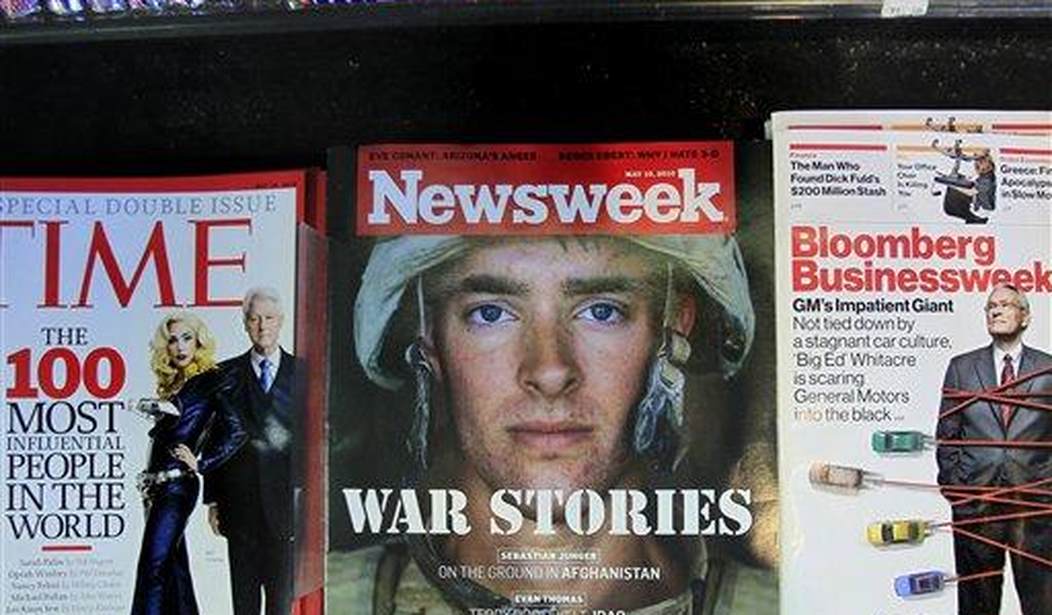I’ve always loved the news. When I was a kid growing up in Detroit, I found the AM dial on the radio and was hooked. In the dentist office, I’d always grab Newsweek over Highlights for Kids. Maybe that had something to do with the fact that I’d already done the hidden images in the drawing on the last page, but I really liked the political cartoons and quote page. That’s part of why what news magazines have become is so disappointing to me.
I get that they have to make money. But when Newsweek sold for a dollar a few years ago, that wasn’t the warning it should have been to do their jobs better, it was the start of these once great institutions turned from important sources of information into a mirror on the Internet.
Printed versions of TIME and Newsweek have become harder find. Grocery stores, many of which used to carry them in the checkout aisles, now don’t carry them at all. If you do manage to find a hard copy, what you find is a leaflet with almost no heft. They’re so thin, with so few pages, they can barely support their own weight. They lay in your hand like an undercooked pancake, which is an honest reflection of the words inside.
A quick look at the Twitter feed of these magazines gives you a peek into just how far they’ve fallen.
Here’s a look at recent tweets from TIME:
“From Marie Antoinette to JoJo Siwa, hair bows have always carried surprising layers of meaning.”
“We counted every line in every Quentin Tarantino film to see how often women talk.”
Newsweek’s feed is worse:
“National Fajita Day 2019: Best deals from Chili's, On The Border, El Corazon, and Fajita Pete's.”
“Ava Duvernay and Chelsea Handler join birth control conversation as #BoycottCVS trends.”
“New attacks, abilities and more revealed in latest 'Pokémon Sword and Shield' trailer.”
See anything resembling news in there? The Pulitzer Prize committee can stop looking.
Recommended
Not a lot of “news” in “Oprah's Favorite Things 2018: 51 fabulous gift ideas,” or “Four Loko reveals new Sour hard seltzer with 14 percent alcohol volume and now all of Twitter is drunk on nostalgia.”
What is likely is they are paid ads disguised as news stories or partnerships where they get a taste of the sales price if someone clicks through and buys something. I have no problem with that, I do have a problem with it being hidden from readers.
What isn’t clickbait or paid content isn’t news either.
A guy no one ever heard of, who claims to have been a Trump supporter who “saw the light,” puts up a blog post “apologizing” to Barack Obama on his birthday suddenly becomes, “Ex-Trump supporter apologizes on Obama's birthday for ‘hate I gave him’ after realizing ‘I did have racist tendencies.’”
In 2016, TIME declared that Kay Perry “just gave herself the best birthday present ever.” What was it? The story noted “(t)he ‘Teenage Dream’ singer gifted herself with the opportunity to vote for the first possible female president in U.S. history.”
TIME and Newsweek were once important, they used to do real, in-depth investigative journalism. Their magazines were must-reads for people wanting a deep dive into the issues of the day. Now there isn’t enough to either to line a birdcage.
I’m using these magazines as examples because their collapses are more profound than others. Cable news used to do news too, now they play roles; they’re table reads for rough drafts of scripts provided by political operatives coupled with the latest celebrity tweets. And, as the uproar at the New York Times over accidentally (and temporarily) writing an honest headline about the President’s speech after the shootings in El Paso and Dayton showed, newspapers are long gone as well.
If you ever wonder why it is that so many of your fellow Americans believe obvious lies – Russian collusion, election hacking, socialism works – look no further than what journalism has become.
There is no institution in America with a larger gap between its potential and its realization; its purpose and its reality, than journalism. Existing institutions can’t be reformed, they need to be destroyed. Newsweek selling for a dollar and losing value from there is an indication that the end is approaching, it just can’t come soon enough.
Derek is the host of a free daily podcast (subscribe!) and author of the book, Outrage, INC., which exposes how liberals use fear and hatred to manipulate the masses
























Join the conversation as a VIP Member